 Petzlover
Petzlover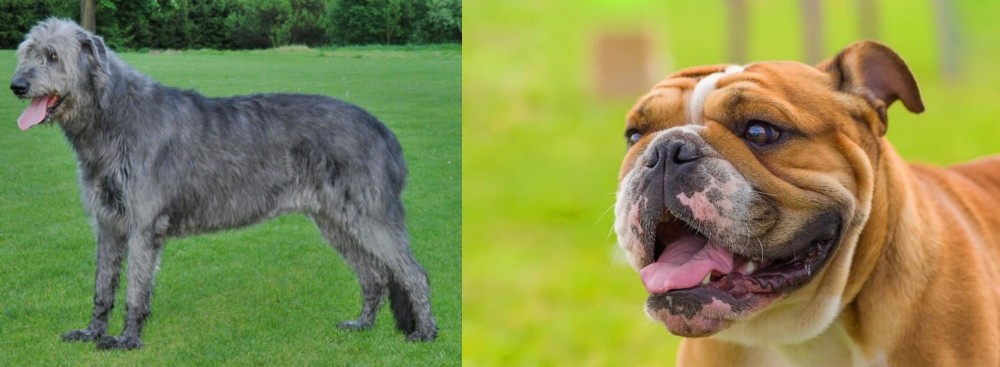 Irish Wolfhound is originated from Ireland but Miniature English Bulldog is originated from United Kingdom. Irish Wolfhound may grow 51 cm / 21 inches higher than Miniature English Bulldog. Irish Wolfhound may weigh 36 kg / 80 pounds more than Miniature English Bulldog. Both Irish Wolfhound and Miniature English Bulldog has almost same life span. Both Irish Wolfhound and Miniature English Bulldog has same litter size. Both Irish Wolfhound and Miniature English Bulldog requires Moderate Maintenance.
Irish Wolfhound is originated from Ireland but Miniature English Bulldog is originated from United Kingdom. Irish Wolfhound may grow 51 cm / 21 inches higher than Miniature English Bulldog. Irish Wolfhound may weigh 36 kg / 80 pounds more than Miniature English Bulldog. Both Irish Wolfhound and Miniature English Bulldog has almost same life span. Both Irish Wolfhound and Miniature English Bulldog has same litter size. Both Irish Wolfhound and Miniature English Bulldog requires Moderate Maintenance.
 It is believed that the Irish Wolfhound is an ancient breed and that it was brought to Ireland as early as 7000 BC.
It is believed that the Irish Wolfhound is an ancient breed and that it was brought to Ireland as early as 7000 BC.
These dogs were bred as hunting dogs as well as guard dogs. There was a time when these huge canines were only allowed to be owned by the nobility. The breed died out somewhat, but Scotsman Captain George Augustus Graham made efforts to restore the breed’s numbers.
Captain Graham devoted his life to making sure the Irish Wolfhound’s numbers were built up, and the breeding program included Great Danes, Borzois, English Mastiffs and Scottish Deerhounds.
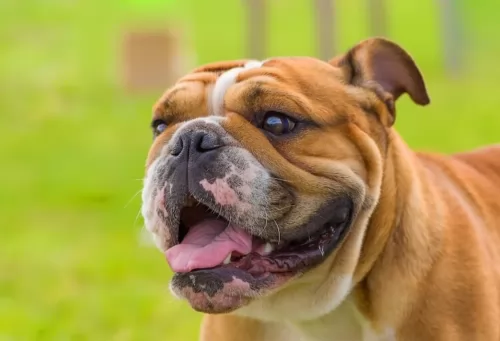 The Miniature Bulldog is such a cute little dog, hailing from England in the 18th and early 19th centuries. The exact development of the dog is unclear and it seems as though the breeders weren’t working together and were working in two different directions.
The Miniature Bulldog is such a cute little dog, hailing from England in the 18th and early 19th centuries. The exact development of the dog is unclear and it seems as though the breeders weren’t working together and were working in two different directions.
There is a lot of debate about the very name ‘miniature’ too because some breeders gave this name to a hybrid mix of a Pug and Bulldog. It seems some breeds were created by crossing English Bulldogs with French Bulldogs to decrease their size. Certainly the origins for the Miniature Bulldog are unknown and there isn’t one particular breeder who can be credited with developing the breed.
Because the Miniature Bulldog is a hybrid breed, it isn’t accepted by the AKC, but it is accepted by the American Canine Hybrid Club as well other registries.
 The tallest of the sighthounds, the Irish Wolfhound looks like a large Greyhound, only he has a rough, wiry type of coat.
The tallest of the sighthounds, the Irish Wolfhound looks like a large Greyhound, only he has a rough, wiry type of coat.
He is also gracefully built and known as a gentle giant. The double coat which can be fawn, red, white, grey, black or brindle is straight to wavy.
He stands at about 81 to 86cm and weighs roughly 48 to 54kg. This is one of the few dog breeds that you can’t really call social. He loves his own human family, and becomes unhappy and ‘down-in-the-dumps’ when separated from his family members for too long. He is a quiet dog who tends to be somewhat introverted and reserved, while being highly intelligent.
He will require being trained and socialized to make him obedient as he is an independent dog. He takes his role as family protector seriously and even though he is quiet, he is ready to take on anyone who threatens his property.
The Irish Wolfhound is a gentle, quiet, soft-natured, easy-going dog and even though it is such a large dog, it doesn’t throw it’s weight around but is calm and patient around the elderly and children in the home. It can tend to be aggressive with animals he isn’t familiar with.
He is an intelligent dog, but even so he may be quite resistant to training as he is strong-willed and determined to have his own way. These dogs need to be trained and socialized otherwise they just do their own thing.
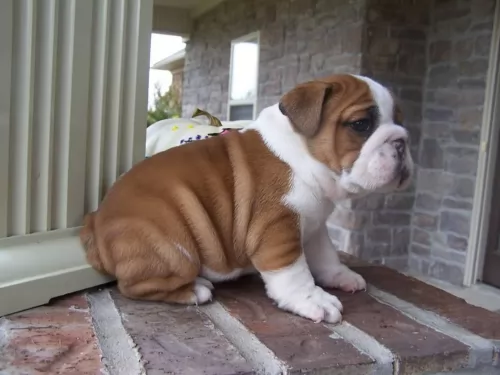 Because the Miniature Bulldog is a cross between two purebred breeds – the Pug and the English Bulldog. You can expect different looks and characteristics from each breed.
Because the Miniature Bulldog is a cross between two purebred breeds – the Pug and the English Bulldog. You can expect different looks and characteristics from each breed.
Your mini Bulldog is a small breed dog standing between 25 and 35cm male and female and weighing between 11 and 18kg. The average litter size for these dogs is about 4 puppies.
The Miniature Bulldog has a short coat which sheds moderately and that comes in different colors such as tan and white, brindle, with black and grey also having a show in.
The Miniature Bulldog is a social, friendly breed who is able to get on well with all members of the family, including children and pets in the home. His very stature makes it that he isn’t the most active of dogs, but nonetheless you still want to exercise him and take him for walks to avoid obesity.
As with all dogs, training and socialization are imperative because this is a strong-willed dog who wants to go his own way.
 The most notable aspect of the Irish Wolfhound is his amazing height. The legs are long, the body narrow. He is gentle and easy-going but because he is a sighthound he loves to give chase after animals.
The most notable aspect of the Irish Wolfhound is his amazing height. The legs are long, the body narrow. He is gentle and easy-going but because he is a sighthound he loves to give chase after animals.
He is capable of living in the city or countryside, but your home will need to cater to his size. He isn’t particularly energetic, enjoying a quiet life but he will absolutely need to be exercised.
Provide your gentle giant with everything needed to make him content, and you’ll have a faithful, loving friend for about 10 years.
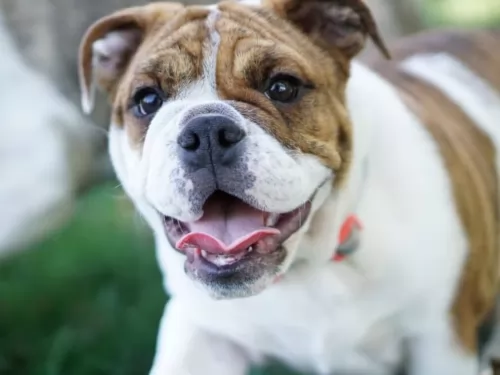 You’ll love having one of these entertaining, friendly dogs by your side. He is docile, social, fun and a bit stubborn too but he is able to get on well with children in the home as well as with other pets.
You’ll love having one of these entertaining, friendly dogs by your side. He is docile, social, fun and a bit stubborn too but he is able to get on well with children in the home as well as with other pets.
He can adapt to life in the city as well as in the countryside as he doesn’t require too much exercise.
Take special care of him and he’ll make you a splendid family pet.
 One wonders why breeders seem so bent on breeding such large dogs when they have health issues and they don't live particularly long. Not only do they cost a fortune to feed, but large dogs like this are more prone to illnesses and won’t live as long as small dog breeds. This big dog can live up to 10 years of age or so.
One wonders why breeders seem so bent on breeding such large dogs when they have health issues and they don't live particularly long. Not only do they cost a fortune to feed, but large dogs like this are more prone to illnesses and won’t live as long as small dog breeds. This big dog can live up to 10 years of age or so.
For starters, just because he is a deep chested dog, bloat or gastric torsion can be a threat. Other illnesses to look out for are dilated cardiomyopathy and bone cancer.
This is a disease of the heart muscle where the enlarged heart won’t function properly. The upper- and lower chambers of the heart are enlarged and the heart isn’t able to pump blood out properly. When the heart’s ventricle doesn’t pump enough blood into the lungs, fluid accumulates in the lungs and this ultimately leads to congestive heart failure.
Older dogs battle more with this heart disease and it is also more common in some dog breeds of which the Irish Wolfhound is one. Your dog will have shortness of breath, coughing and abdominal distension. He will need to get to the vet for medical tests.
Bone cancer can strike any dog, but you’ll find in more commonly with larger dog breeds. It can spread quickly and the long term prognosis isn’t good. It’s not easy to pick the disease up and it can mean joint pain for your pet and even lameness.
Your dog will be tired too. Your vet will do X-rays and other tests, but unfortunately the prognosis isn’t usually good. Big-dog breeders should take this into consideration.
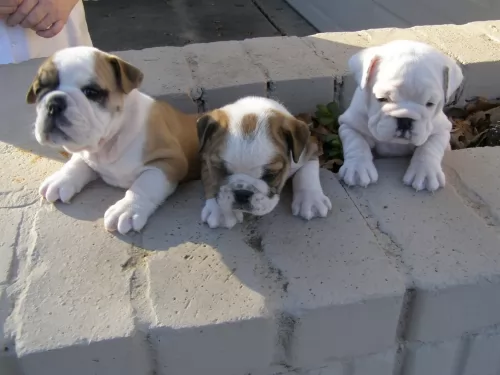 Unfortunately the origins of the Miniature English Bulldog are not 100% clear and therefore other important information isn't readily available.
Unfortunately the origins of the Miniature English Bulldog are not 100% clear and therefore other important information isn't readily available.
These dogs are always prone to breathing and nasal abnormalities because of the shape of their faces as well as being prone to heart deficiencies. Snoring, grunting and quite a bit of panting is part and parcel of the mini English Bulldog.
They’re also prone to overheating, cherry eye and hip dysplasia. It is most unlikely that your Miniature English Bulldog is going to get any of these illnesses and the good news is that he can live to be up to 12 years of age.
 This isn’t a particularly energetic dog and he can tend to become lazy. Don’t allow this as becoming unfit and overweight can be very bad for such large dog. Being so large already puts stress on the dog’s body, and the dog is already susceptible to cardiac and skeletal problems. Allowing him to become lazy and overweight will be a death sentence for this large dog. It is imperative to make sure you take him on walks and play games with him.
This isn’t a particularly energetic dog and he can tend to become lazy. Don’t allow this as becoming unfit and overweight can be very bad for such large dog. Being so large already puts stress on the dog’s body, and the dog is already susceptible to cardiac and skeletal problems. Allowing him to become lazy and overweight will be a death sentence for this large dog. It is imperative to make sure you take him on walks and play games with him.
The coat of your dog is thick and medium length and he will require being brushed at least twice a week. You may want to also trim the longer hair you find around his face and legs.
When it comes to his ears, you can moisten some cotton wool and wipe the inside of his ears to remove dirt and excess wax. Remember not to probe too deeply to avoid damaging the ear. If you’re uncertain how to do this, your vet can explain to you how its done.
Check his teeth regularly as dental disease can affect other areas of the body too. Don’t allow his nails to get too long as they can cause paw problems and the nails can hook onto things and cause injury.
Because this is a giant breed, the puppy will grow for a long time. Speak to your vet about how to ensure you feed your puppy in such a way that he doesn’t grow too quickly.
If you feed your dog a commercially manufactured food, make sure its one of the top quality brands. Include home-made cooked food such as chicken, rice and vegetables into his kibble from time to time, and also try to feed him some raw meat occasionally.
Fresh, cool water must be available to your Irish Wolfhound around the clock.
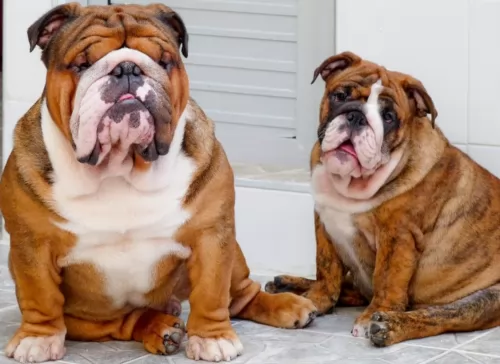 Feeding the Miniature English Bulldog is hugely important. It is imperative that he doesn't become obese. Buy the best dog food there is and see to it that he also gets some home-made food. Chop up boiled chicken, brown rice ad vegetables for your pet and mix occasionally into his dry kibble.
Feeding the Miniature English Bulldog is hugely important. It is imperative that he doesn't become obese. Buy the best dog food there is and see to it that he also gets some home-made food. Chop up boiled chicken, brown rice ad vegetables for your pet and mix occasionally into his dry kibble.
Dogs love simple food – their stomachs can’t cope with different foods. They appreciate consistency with uncomplicated but nutritious foods. The bulldog is a dog which can easily overheat, so make sure he has constant access to fresh cool drinking water. On a hot day you can even use a spray bottle and allow some spray mist sprayed into his face to cool him down.
The Mini English Bulldog is a dog that sheds so you will need to brush him at least twice a week to get rid of loose hair.
Check around his eyes and inside his ears for infection.
Brush his teeth 2 or 3 times a week to get rid of plaque so as to prevent dental decay which can be detrimental to his health.
His face and body have wrinkles, making him more susceptible to skin allergies and you’ll need to keep your eye open for these as they can be terribly painful and frustrating for your pet.
Keep his nails trimmed.
He is neither sleek, agile or quick and you can see just by looking at him that he isn’t designed for being sporty. A slow walk every day will be enough for him as well as some easy-going games inside.